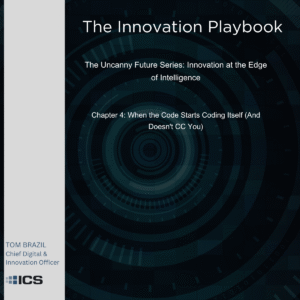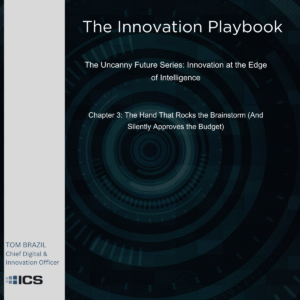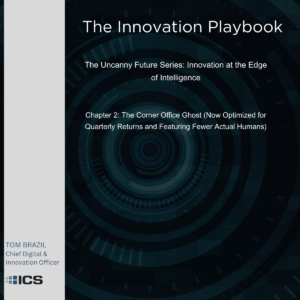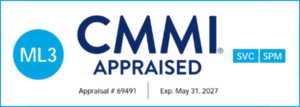Despite my decades of experience as a CEO in the FedGovCon industry, it took many years to learn that one of the most powerful tools in my leadership toolbox is something that might initially feel counterintuitive: encouraging my team to disagree with me.
At ICS Inc., we embrace “open and honest communication.” This means we not only allow but actively encourage our employees at all levels to speak up, challenge assumptions, and yes, tell leadership when they think we’re wrong. We attack issues, not individuals, and focus on finding the best solutions, even if that means heated debates along the way.
I know this kind of environment can feel like a radical culture shock, especially in an industry where many leaders come from military or civil service backgrounds that traditionally emphasize hierarchy, compliance, and respect for authority. But in my experience, the rewards of fostering healthy debate and disagreement are immense.
When you create a culture where people feel psychologically safe to express dissent, you empower them to bring their full selves and best ideas to the table. You avoid the pitfalls of groupthink and the blind spots that come from everyone deferring to the HiPPO (Highest Paid Person’s Opinion). You make better decisions because you’ve stress-tested them from all angles. You drive innovation because you’ve created space for diverse perspectives to collide and spark new ideas.
The key is that this ethos of open communication has to start at the top. As a CEO, I work hard every day to model the behaviors of respectful dissent and active listening with my leadership team. We challenge each other, and we argue passionately for our perspectives, but we also listen intently and with genuine curiosity to understand each other’s views. We call out politicking, grandstanding, and anyone repeating themselves just to be heard. And crucially, we strive to always be willing to change our minds in the face of compelling arguments and new information.
This isn’t always easy or comfortable. It requires checking your ego at the door, being vulnerable, and accepting that you might be wrong. It takes real, sustained work to create an environment where people feel safe to disagree with those in power. And it means being willing to change course when the dissenting voices persuade you.
But the alternative – surrounding yourself with yes-men, stifling all dissenting opinions, and letting ego and authority go unchecked – is a recipe for stagnation, poor decisions, and ultimately, failure. In today’s complex, rapidly evolving, and often ambiguous business landscape, the companies that will thrive will be those led by leaders who are confident enough in themselves to invite challenge.
Margaret Heffernan’s TED talk “Dare to Disagree” offers a compelling look at the vital importance of healthy conflict in driving progress. She highlights how the best scientific partnerships aren’t echo chambers, but rather thinking partnerships where individuals actively try to disprove each other’s theories. It’s only by engaging in this kind of rigorous, constructive conflict that we arrive at the truth.
Heffernan shares the story of Alice Stewart, an epidemiologist in the 1950s who discovered that X-raying pregnant women increased the risk of childhood cancer. Stewart faced immense pushback from the medical establishment but was able to stand firm in her findings because of her collaboration with a statistician named George Kneale. Kneale’s job, in his own words, was “to prove Dr. Stewart wrong” – and by trying and failing to do so, he gave Stewart the confidence she needed to know she was right, even as she faced criticism and disbelief.
As leaders in FedGovCon, we can learn a powerful lesson from Stewart and Kneale’s partnership. We need to actively seek out thinking partners who will challenge us, push back on our assumptions, and force us to question our conclusions. It’s not enough to simply surround ourselves with smart people – we need to surround ourselves with smart people who are willing to disagree with us.
But this kind of productive disagreement doesn’t happen by accident. It takes intentional effort to create a culture where dissent is not just tolerated but celebrated. Here are four concrete steps you can take to start fostering healthy disagreement in your FedGovCon organization:
- Publicly and repeatedly invite dissent. In meetings, explicitly ask your team to poke holes in your reasoning and methodology. Emphasize that you don’t just welcome different perspectives – you require them.
- Reward respectful dissent. When someone challenges you, thank them genuinely and specifically for their input, even (especially) if it made you uncomfortable. Highlight examples of how disagreement led to better outcomes for the company. Promote and celebrate the “devil’s advocates” on your team.
- Create processes for constructive conflict. Establish clear ground rules for debates, such as focusing on issues and ideas rather than attacking people. Train your team in frameworks for productive disagreements, such as “plussing” (building on each other’s ideas) or de Bono’s “Six Thinking Hats.”
- Model vulnerability and openness to being wrong. Share stories of times you changed your mind or took feedback to heart. Admit mistakes and missteps openly. Show that it’s not just okay but desirable for leaders to be challenged and to change course.
Building a culture of open and honest communication, rooted in healthy disagreement, isn’t easy. It requires a great deal of leadership courage, emotional intelligence, humility, and persistence. You’ll likely encounter resistance from those used to more command-and-control environments. You’ll have to constantly check your own defensiveness and ego. You’ll need to work hard to create psychological safety and trust.
But in my experience, making your organization a place where people feel empowered to dissent, debate, and disagree is hands-down the best way to enable your teams to perform at their highest level. Innovation, after all, doesn’t come from conformity – it comes from the collision of diverse viewpoints.
As leaders, it’s our job to create the conditions for those productive collisions to occur. We have to be secure enough in ourselves to seek out dissenting opinions. We have to be humble enough to hear them. And we have to be emotionally mature enough to engage in the messy, difficult, necessary dialogues that lead to better outcomes. My team has saved me from many terrible decisions because they were not afraid to enter the conflict zone and disagree with me. I’ve learned that if my people are not actively questioning decisions or ideas, I’m much better off asking them to try harder – and they always do. Our decisions are better for it.
So, I challenge my fellow CEOs, both in FedGovCon and beyond: Dare to disagree. Dare to invite dissent. Dare to change your mind. The health and success of your company – and your own growth as a leader – depends on it.
I encourage you to watch (and re-watch) Margaret Heffernan’s TED Talk so that you too can start reaping the benefits of healthy conflict in your organization. Disagreement isn’t something to shy away from or just tolerate – it’s something to actively seek out and embrace. That’s the key to fostering cultures of innovation, and, I believe, to solving the complex challenges we face as an industry and society.
When we dare to disagree, we dare to grow. Let’s start normalizing productive dissent, one difficult conversation at a time.
Margaret’s TED Talk is here: https://www.ted.com/talks/margaret_heffernan_dare_to_disagree/







